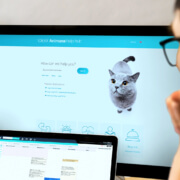But…
Good news followed by a ‘but’ must mean something bad is coming. ‘But’ unconsciously has a negative connotation, which you can thank your subconscious brain for. It probably applies to this article too.
If you start paying attention to it, you’ll notice that the signal word ‘but’ is frequently used, and you will undoubtedly regularly catch yourself using it. However short the word may be, and despite good intentions, it can unintentionally have a considerable impact – nullifying everything positive that came before it.
Consider these examples:
- This medication is difficult to administer, but it’s not immediately a problem if you’re unable to administer it.
- Your dog must have an empty stomach, but forgetting is not a big problem for implementing the treatment.
- Bring your vaccination booklet, but if you forget, you can come later, and we can stamp it then.
The word ‘but’ often erases everything before it. Indeed, in practice, everything after it is remembered better, so the customer leaves with the wrong message. But it’s not just about erasing; using the word ‘but’ puts your unconscious brain on edge because what comes after it is bound to be very important.
Now the positive side.
“We have to admit Sam for three days for infusion and intensive care, but…”. The ‘but’ in this sentence deliberately builds tension. Before uttering this sentence, the pet owner was already aware of the possible negative consequences; worries about a pet’s health, perhaps even the pet’s loss, and the cost of the treatment are usually already in an owner’s mind.
However, the ‘but’ here emphasises the owner’s hoped for result. It softens the negative message and emphasises the positive.
Honestly, naming the disadvantages makes any message more credible. After all, it would be best if you always told the whole story and lay all your cards on the table. Telling the whole message increases owner confidence simply because it involves more than just you – you’re being vulnerable, are not making things look better than they are, and you’re not selling dreams.
- “I don’t have a spot in the calendar for today, but I have three other options for you…”
- “The prognosis for Sam is poor, but we will do our best to make the last period…”
- “The medication needs to be given three times a day, but with proper follow-up, it is…”
Do you recognise these examples? And do you feel what happens when the word ‘but’ is used cleverly? You can create more credibility, trust, and optimism by starting with the negative.
Immediately after planting the emotion, the message before the ‘but’ is forgotten. More value is attached to the second part of the message, the message that you ultimately want to convey. You say: I heard you (I am in control), and now I will give you the solution or the answer.
Let’s talk about what IDEXX software can do for your practice
Complete the form below and we’ll get back to you.







